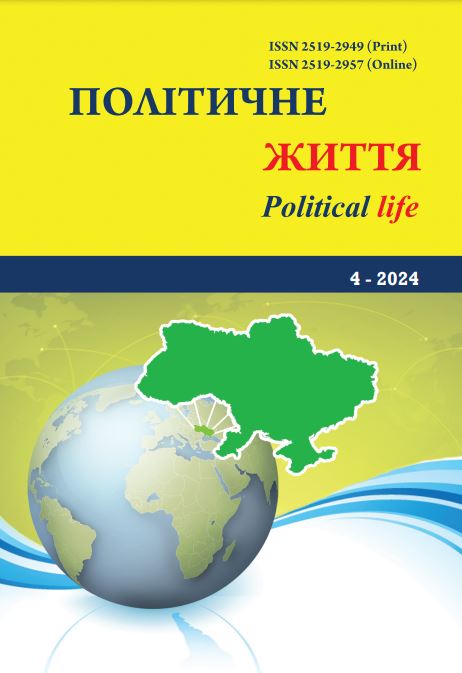The Russia-Ukraine War in the Interpretation of Structural Realism
DOI:
https://doi.org/10.31558/2519-2949.2024.4.12Keywords:
realist tradition, structural realism, the causes and nature of war, the Russia-Ukraine WarAbstract
The Russia-Ukraine War has become a critical factor in present-day International Relations, a subject of reflection by representatives of all major traditions in the theory of International Relations. The study aims to determine the peculiarities of the interpretation of the origin, nature and possible consequences of present-day Russia’s war in Ukraine within the framework of neorealism. All realist theories are united by the recognition of sovereign states as key actors of world politics, which act rationally, trying to maximize their influence in the international system. The realists understand anarchy as the absence of a legitimate supreme authority to regulate disputes and ensure the implementation of agreements between states or other subjects. At the same time, the anarchy of the system does not act as a direct cause of war but creates a favourable environment for its conflict of interests and international rivalry. The determining factor in world politics, which explains the causes and course, as well as the results of wars and the prospects for peace, is the distribution of power in the international system. The founder of neorealism, Kenneth Waltz, considered the structural characteristics of the international system, to which he refers anarchy and the distribution of power within the system, to be fundamental. Accordingly, structural realists consider the «deep cause» of Russia’s invasion of Ukraine to be the West’s violation of the balance of power because of NATO’s expansion to the East, which corresponds to the perception of International Relations in the context of endless competition between great powers for influence in the international system. The neorealist interpretation of war has some severe shortcomings that have become the subject of criticism from the representatives of other approaches within the framework of realism (neoclassical realism, renewed classical realism) and researchers presenting other theoretical traditions (constructivism, Historical Sociology in International Relations).
References
A conversation with Henry Kissinger. The transcript of his meeting with our journalists. May 17, 2023. URL: https://www.economist.com/kissinger-transcript (дата звернення: 17.05.2023).
Drezner D.W. Can realism explain the war in Ukraine? The Washington Post. March 3, 2022. URL: https://www.washingtonpost.com/outlook/2022/03/03/can-realism-explain-war-ukraine/ (дата звернення: 17.08.24).
Edinger H. Offensive ideas: structural realism, classical realism and Putin’s war on Ukraine. International Affairs. 2022. Vol. 98. № 6. P. 1873-1893.
Ito R. Hubris balancing: classical realism, self-deception and Putin’s war against Ukraine. International Affairs. 2023. Vol. 99. № 5. P. 2037-2055.
John Mearsheimer on why the West is principally responsible for the Ukrainian crisis. The Economist. March 19, 2022. URL: https://www.economist.com/by-invitation/2022/03/11/john-mearsheimer-on-why-the-west-is-principally-responsible-for-the-ukrainian-crisis (дата звернення: 09.12.2022).
Kirshner J. An Unwritten Future. Realism and Uncertainty in World Politics. Princeton & Oxford: Princeton University Press, 2022. 336 p.
Kirshner J. Offensive realism, thucydides traps, and the tragedy of unforced errors: classical realism and US–China relations. China International Strategy Review. 2019. Vol. 1. P. 51–63.
Kupchan Ch. A. It’s Time to Bring Russia and Ukraine to the Negotiating Table. The New York Times. November 2, 2022. URL: https://www.nytimes.com/2022/11/02/opinion/russia-ukraine-negotiation.html (дата звернення: 10.07.2024).
Lebow R.N. International Relations Theory and the Ukrainian War. Analyse & Kritik. 2022. Vol. 44. № 1. P. 111-135.
Levy J. S., Thompson W.R. Causes of War. Wiley-Blackwell, 2010. 288 p.
Lukyanov F. Graham Allison: ‘Time to Search for an Off-Ramp’ in Ukraine. URL: https://www.russiamatters.org/analysis/graham-allison-time-search-ramp-ukraine (дата звернення: 31.10.2022).
Mearsheimer J.J. The Tragedy of Great Power Politics. New York, London: W.W. Norton & Company, 2001. XVI, 555 p.
Mearsheimer J.J. Why the Ukraine Crisis Is the West’s Fault. The Liberal Delusions That Provoked Putin. Foreign Affairs. 2014. Vol. 93. № 5. P. 77-89.
Paul R. What Putin’s Invasion Means for Foreign Policy Realism. The National Interest. March 7, 2022. URL: https://nationalinterest.org/feature/what-putin%E2%80%99s-invasion-means-foreign-policy-realism-201015 (дата звернення: 14.04.2022).
Poast P. A World of Power and Fear. What Critics of Realism Get Wrong. Foreign Affairs. June 15, 2022. URL: https://www.foreignaffairs.com/articles/ukraine/2022-06-15/world-power-and-fear (дата звернення: 16.06.2022).
Polinder S. Russia-Ukraine War from a Moral-Realist Approach. Providence. April 8, 2022. URL: https://providencemag.com/2022/04/russia-ukraine-war-moral-realist-approach-moral-realism/ (дата звернення: 14.04.2022).
Schouten P. Theory Talk № 53: Ned Lebow on Drivers of War, Cultural Theory, and IR of Foxes and Hedgehogs. Theory Talks. 2013. URL: http://www.theory-talks.org/2013/03/theory-talk-53.html (дата звернення: 03.12.2023).
Smith N.R., Dawson G. Mearsheimer, Realism, and the Ukraine War. Analyse & Kritik. 2022. Vol. 44. № 2. P. 175-200. URL: https://doi.org/10.1515/auk-2022-2023.
Tooley M. Christian Realism vs Cynicism & Idealism. Providence. March 10, 2022. URL: https://providencemag.com/2022/03/christian-realism-vs-cynicism-idealism/ (дата звернення: 03.04.2022).
Transcript: Ezra Klein Interviews Emma Ashford. URL: https://www.nytimes.com/2022/03/18/podcasts/transcript-ezra-klein-interviews-emma-ashford.html (дата звернення: 11.04.2022).
Transcript: Ezra Klein Interviews Fareed Zakaria. URL: https://www.nytimes.com/2023/06/02/podcasts/transcript-ezra-klein-interviews-fareed-zakaria.html (дата звернення: 10.07.2023).
Tsygankov A.P. At War with the West: Russian Realism and the Conflict in Ukraine. Journal of Military and Strategic Studies. 2022. Vol. 22. Issue 2. P. 110-128.
Walt S.M. An International Relations Theory Guide to the War in Ukraine. Foreign Policy. March 8, 2022. URL: https://foreignpolicy.com/2022/03/08/an-international-relations-theory-guide-to-ukraines-war/ (дата звернення: 03.01.2023).
Walt S.M. A Practical Guide to Perpetual Peace. Foreign Policy. December 29, 2023. URL: https://foreignpolicy.com/2023/12/19/realist-guide-world-peace/ (дата звернення: 25.09.2024).
Walt S.M. Liberal Illusions Caused the Ukraine Crisis. Foreign Policy. January 19, 2022. URL: https://foreignpolicy.com/2022/01/19/ukraine-russia-nato-crisis-liberal-illusions/ (дата звернення: 06.11.2024).
Walt S.M. The Top 5 Lessons From Year One of Ukraine’s War. Foreign Policy. February 9, 2023. URL: https://foreignpolicy.com/2023/02/09/the-top-five-lessons-from-year-one-of-ukraines-war/?tpcc=recirc_trending062921 (дата звернення: 26.02.2023).
Walt S.M. The Ukraine War Doesn’t Change Everything. Foreign Policy. April 13, 2022. URL: https://foreignpolicy.com/2022/04/13/ukraine-war-realism-great-powers-unipolarity/ (дата звернення: 25.10.2024).
Walt S.M. Was Henry Kissinger Really a Realist? Foreign Policy. December 5, 2023. URL: https://foreignpolicy.com/2023/12/05/was-henry-kissinger-really-a-realist/?utm_source=Sailthru&utm_medium=email&utm_campaign=Subscriber… (дата звернення: 12.01.2024).
Waltz K.N. Structural Realism after the Cold War. International Security. 2000. Vol. 25. № 1. P. 5-41.
Waltz K.N. Theory of International Politics. Reading, Mass.: Addison-Wesley Publishing Company, 1979. 251 p.
War in Ukraine: Conflict, Strategy, and the Return of a Fractured World. Ed. by Hal Brands. Baltimore: Johns Hopkins University Press, 2024. 324 p.
What Putin Got Wrong About Ukraine, Russia, and the West. A Conversation With Stephen Kotkin. Foreign Affairs. May 26, 2022. URL: https://www.foreignaffairs.com/podcasts/what-putin-got-wrong-about-ukraine-russia-and-west (дата звернення: 13.09.2024).
Zand B. Crisis Researcher Graham Allison on the Ukraine War: «Dealing with Horrible Leaders Is Part of the History of International Relations». URL: https://www.spiegel.de/international/world/interview-dealing-with horrible-leaders-is-part-of-the-history-of-international-relations-a-31a0aabb-35eb-4107-a65f-39ae5f79c9e7 (дата звернення: 06.06.2022).

